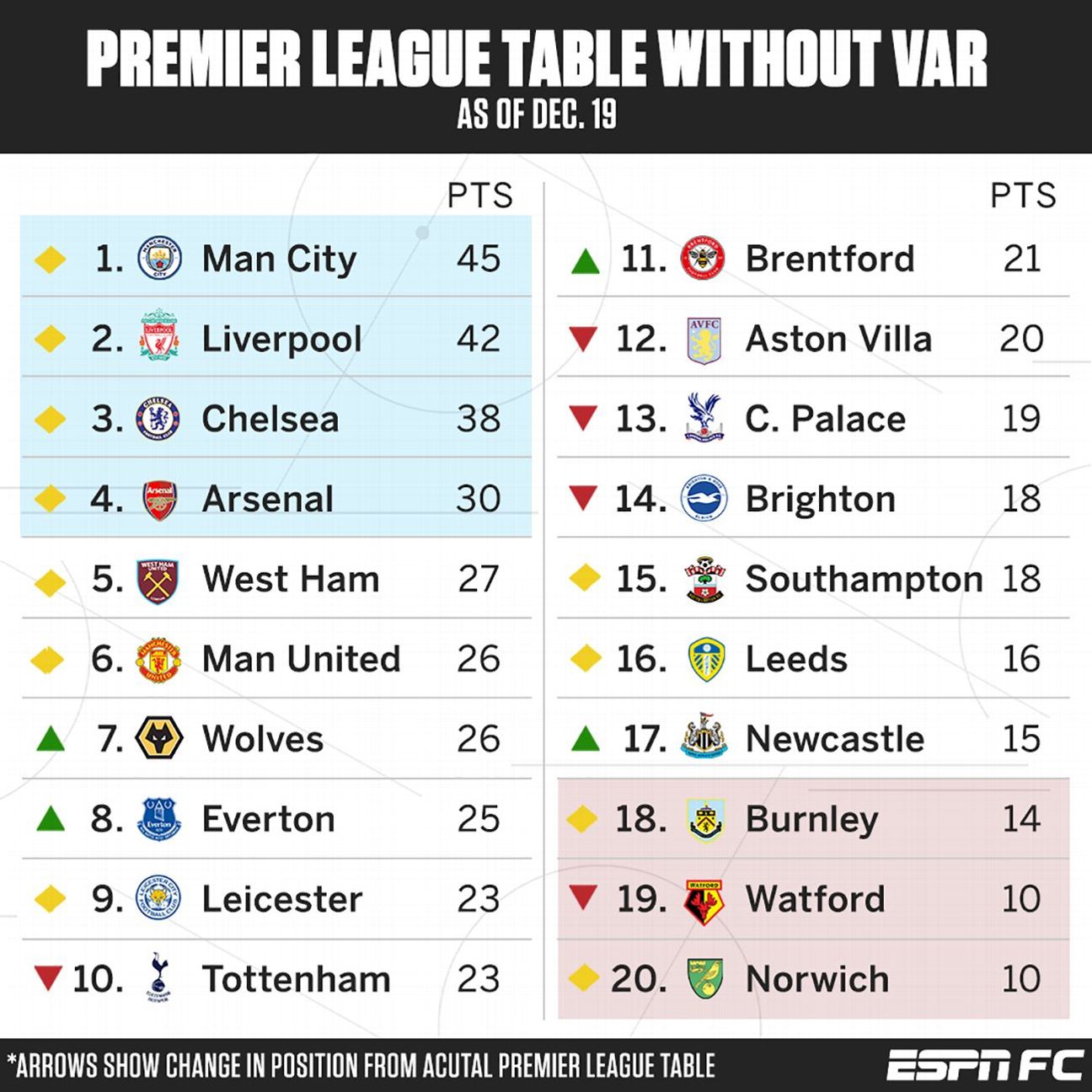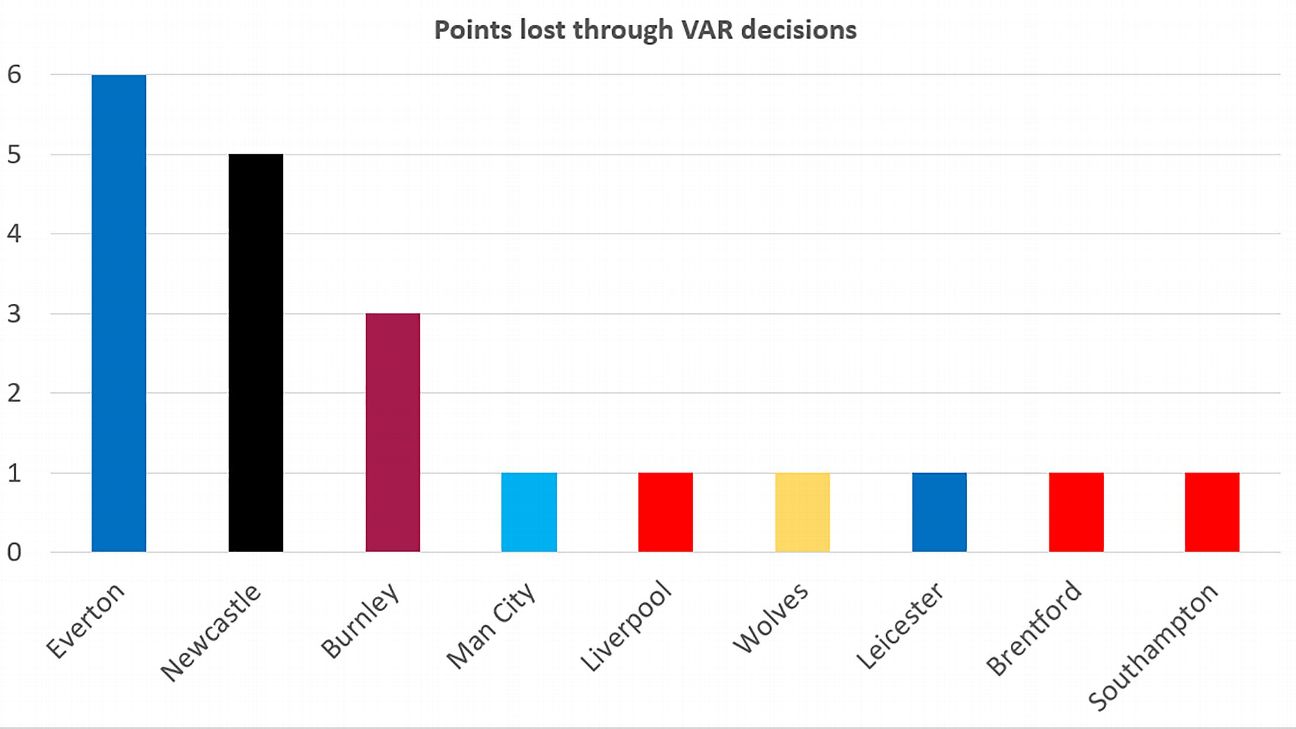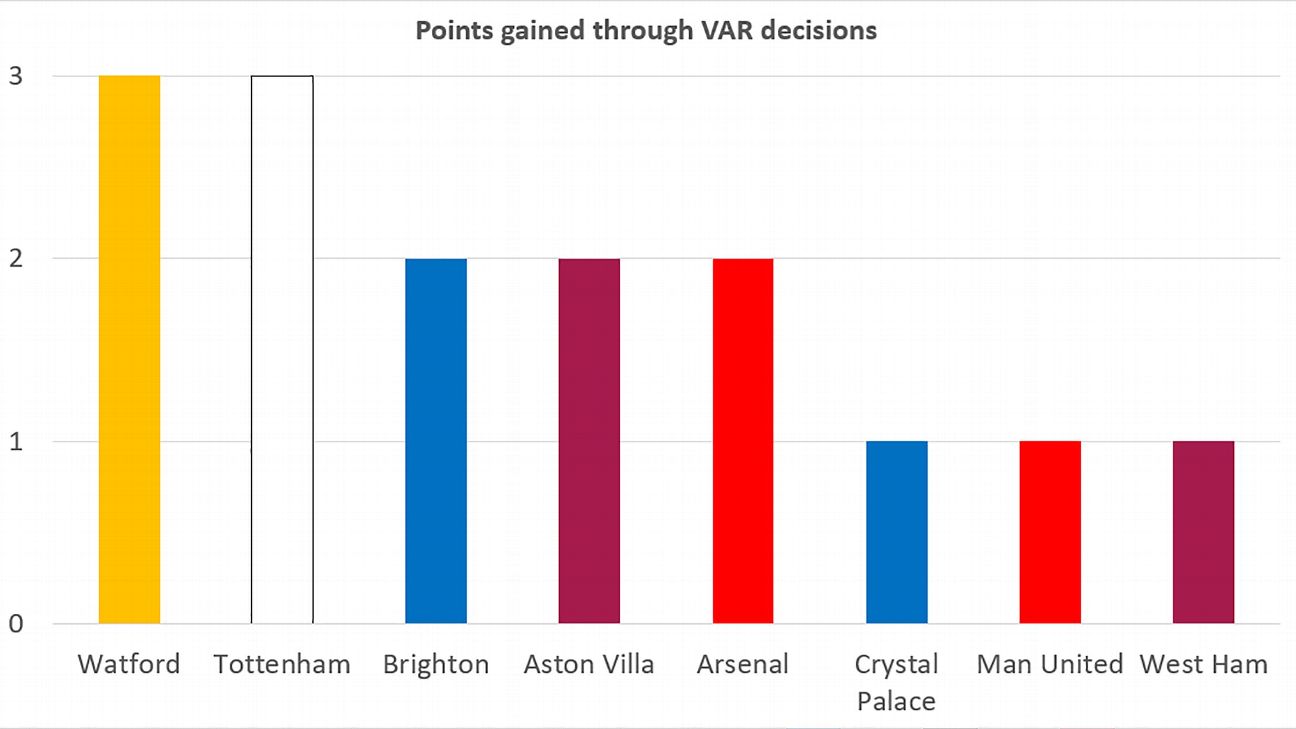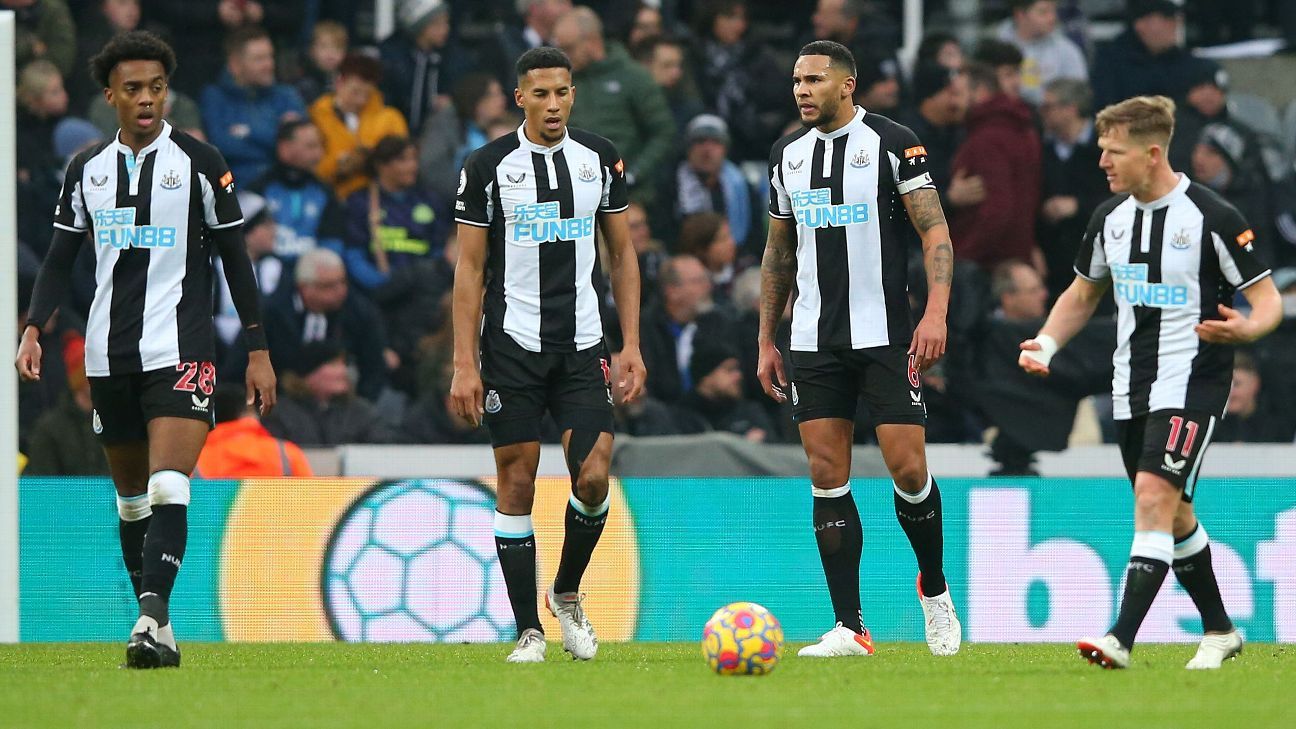Products You May Like
It’s been a tough season for Newcastle United fans, even though they became the richest club in the world following their Saudi Arabia-led takeover earlier this year.
The Magpies remain marooned in the relegation zone, level on points with rock-bottom Norwich City. And with 11 goals conceded, and just one scored, in their last three games there is little Christmas cheer among the fans.
The club and their supporters aren’t only unhappy with the team but with the referees as well. So much so that the Daily Telegraph reported on Monday that the relegation-threatened club are ready to make a formal complaint to the Premier League over the standard of officiating in their matches.
And ESPN can reveal that without the decisions of the VAR, Newcastle would be outside the drop zone looking down on their rivals.
This season we’re looking at all VAR decisions across the Premier League, and seeing how they might have affected the outcome of games.
It’s not just about the number of times a team gets a favourable VAR call or about how many goals are affected. What’s more important is when these VAR decisions take place, how they might have changed the course of the game and, crucially, whether that impact would ultimately have changed the final score.
ESPN brings you the VAR Effect Table. We’ve taken all 59 VAR decisions in the Premier League so far this season and calculated how they might have changed the outcome of matches. We’ll continue to track VAR throughout the season and find out who the true winners and losers are.
– JUMP TO: The winners without VAR | The losers without VAR
How we work out the VAR Effect Table
We take only the first VAR overturn in each game, because the calculation considers that any subsequent VAR incident wouldn’t have happened because the whole direction of the game has been altered. (Think of it like a Marvel timeline, or the plot of any time travel movie.)
The VAR decision is then reversed to the original on-field call — so if a goal is disallowed for offside, it’s given as a goal.
If a penalty has been cancelled, it is considered to have been awarded and scored, unless the team in question has a penalty-conversion record below 50% over the season. For instance, so far this season Arsenal have missed all three of their penalties, while every other team bar Manchester United, Watford and West Ham United have a 100% record. If below 50%, the penalty may be judged to have been missed.
If a team has been awarded a goal through a penalty or an incorrect offside through VAR, the goal is disallowed.
We then take into account a series of factors before settling on a predicted outcome:
Team form: Results in the previous six matches give an indication of how a team has been playing generally.
Time of incident: For instance, if an incident happens late in the game, it’s less likely that the scoreline would change again after this point.
xG at time of incident: This allows us to take into account which team has been creating the better chances and is in the ascendancy.
Team strength: As well as form, a team’s general strength plays a part. This takes into account league position, and a team’s goal-scoring and defensive records across the season.
Impact of incident: For example, a red-card decision being reversed may change the outcome of a match.
These results have then been used to modify the table and work out what impact VAR has had on teams’ positions this season.
The table shows each team’s position after the amended results, with the arrows indicating if their league position is better or worse without VAR. It’s worth noting that not all teams have played the same number of games at this time due to COVID-related postponements.

The big winners without VAR
Newcastle might take the headlines, but it is in fact Everton who get back the most points and places without VAR decisions.
Rafael Benitez, under pressure as Everton’s poor form has seen them slump to 14th in the table, gains a huge six points, and that sends the Toffees shooting up six places into eighth — and just two points behind West Ham in fifth.
So where do Everton benefit? They pick up two points after having a late winner at Man United ruled out for offside, while Everton were two goals up at home to Watford before the Hornets got back into the game through a VAR decision — that becomes a victory. Also, they had a VAR-cancelled penalty at home to Tottenham, and that results in another win.
Then it’s Newcastle, who see their points tally jump 50% — from 10 to 15 — and that is enough to lift them out of the relegation zone, up two places into 17th.
Everton and Newcastle have both had seven negative VAR decisions — more than any other club. But the Magpies really suffer when it comes to goals, with six going to the opposition as a result of VAR and a net goal score of -4 — both the worst in the Premier League. The Magpies have also conceded the most penalties, with three decisions going against them.
Newcastle lost at home to West Ham in August after the Hammers were given an early goal, while Southampton were given an injury-time penalty at St James’ to snatch a late draw. And Tottenham were given a goal through an offside call in a game Newcastle lost 3-2.
So new boss Eddie Howe is going to have to hope he gets more from VAR if Newcastle are to stay up.
Burnley are the only other club to benefit by more than one point, gaining three through a 1-1 draw against Arsenal (they lost that game) and a 3-2 victory at Leicester (which was a draw). But that isn’t enough to lift Sean Dyche’s side out of the bottom three as they are overtaken by Newcastle.
Liverpool and Manchester City both get a net gain of one point, which obviously doesn’t change the picture at the very top of the table. However, Chelsea‘s tally is unaltered, and that means they drop further behind in the title race.
Brentford, Leicester City, Southampton and Wolverhampton Wanderers are also one point better off. Wolves are the only team in the league not to have a single VAR decision in their favour.
Leeds United and Norwich City see their points tally — and their league positions — unaltered when all VAR overturns are factored in.

The big losers without VAR
It’s been a tough start to life at White Hart Lane for Antonio Conte, but Tottenham Hotspur‘s position could be a lot worse without VAR.
Spurs lose three points, and drop from seventh to 10th in the table. Their draw at Everton becomes a 1-0 defeat, while the victory at Newcastle is changed to a 2-2 draw.
Tottenham are the only club in the Premier League not to have a VAR decision go against them this season, and they have benefitted the most from subjective calls. And they also survived a possible VAR red card for Harry Kane and VAR penalty for a foul by Emerson Royal on Liverpool‘s Diogo Jota on Sunday.
Watford also get three points taken off them, with the win at Everton now a loss, and that sends them crashing onto 10 points — level with bottom-of-the-table Norwich.
Arsenal‘s resurgence is checked. Rather than being four points behind third-placed Chelsea, that gap grows to six as the Gunners lose two points. VAR cancelled a Burnley penalty when Aaron Ramsdale was adjudged to have brought down Matej Vydra, when the Gunners were 1-0 up. That is the only Arsenal result that the formula says was affected by a VAR decision.
Both Aston Villa, who drop two places into 12th, and Brighton & Hove Albion lose two points too.
West Ham United and Manchester United, just behind the Gunners in the table, both lose one point but stay fifth and sixth, respectively. Man United’s draw at home to Everton becomes a 2-1 loss, with Yerry Mina‘s 85th-minute offside “winner” allowed.

One other club loses one point, and that’s Crystal Palace. Patrick Vieira’s men fall two places, from 11th to 13th.
